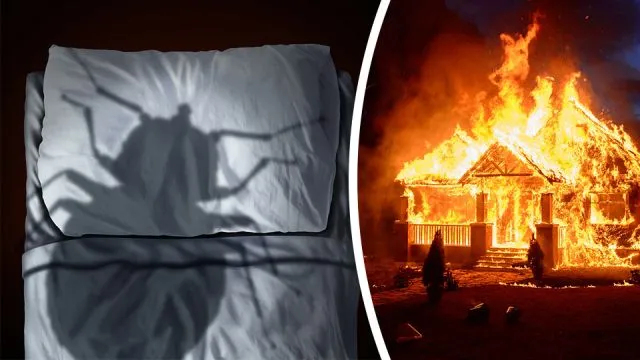
- Share on Facebook153
- Share on Pinterest
- Share on Twitter
Ten people were left homeless over the weekend when a woman accidentally set her two-story home ablaze late Friday night in order to fight bed bugs.
The woman was reportedly trying to combat the bugs with rubbing alcohol, in a multi-family home in Cincinnati. It appears she was near a flame while using the alcohol. A resident took this video of the house burning down.
According to WXIX-TV, this is the second time in just two weeks in the state that a fire has resulted from attempts to combat bed bugs. The other incident occurred when a teenager set fire to an apartment after dousing a bed bug with alcohol, leaving eight people homeless.
In a reversal of events, in October this year, three people died in Mexico from ticks, then health authorities burned their house down in order to control the tick plague, which was extensive.
Best ways to beat bed bugs
Though they may not be as scary as a house on fire, most common bed bug killers are toxic and will do more harm than good. In an eight-year period, California for example, had more than 7,600 pesticide poisoning cases, with around half of those cases taking place in the home or garden rather than in agricultural areas.
When it comes to bed bugs specifically, the Centers for Disease Control and Prevention counted 80 illnesses and one death linked to bed bug pesticides over a period of three years. The death involved a woman who used 18 cans of chemical fogger to attack the bugs.
Once a bed-bug infestation gets serious, most U.S. authorities recommend using professional services. However, in the early stages, there are healthy and green strategies to beat bugs:
- Boiling water and freezing temperatures kill bed bugs, as do temperatures below freezing. Soak any clothes, bed covers and so on that may be infected in boiling water. If you have the equipment, steam cleaning carpets, furniture and drapes, is also a good idea.
- Once you have got rid of any bed bugs, pull your bed away from the wall, keep sheets off the floor, and isolate your bed by putting its legs in dishes of liquid, like tea tree oil.
- Borax and silica powder kill bugs by rubbing off their shells and drying them out. Such dust can be applied in cracks and crevices where the bugs like to hang out.
- Bed bugs have also developed resistance to many pesticides, so the CDC and EPA recommend diatomaceous earth, combined with the above methods. This is something the professionals use — sprinkle it on mattresses while wearing a dust mask, then vacuum up the excess before going to bed.
- Finally, stay level-headed. While bed bugs are a pain, and their bites can be very itchy, they do not transmit any diseases to humans. Richard Pollack, a Harvard University entomologist recommends hiring professional exterminators after comparing quotes from a range of companies, and stresses that all the bugs pass onto humans is “hysteria.”
— Tamara Pearson
- Share on Facebook153
- Share on Pinterest
- Share on Twitter

